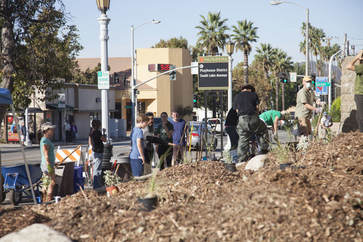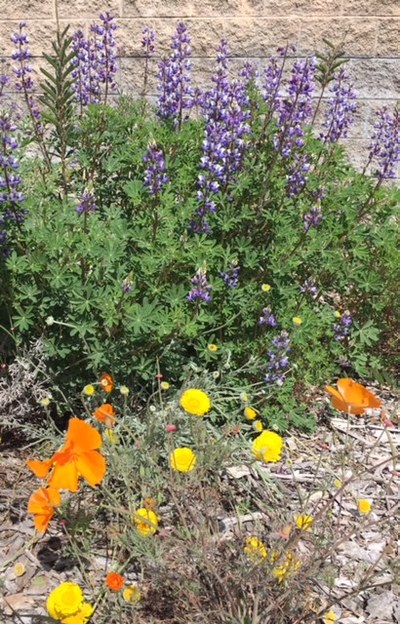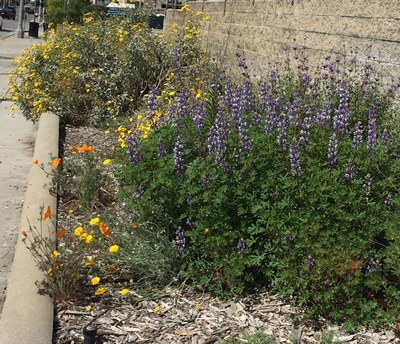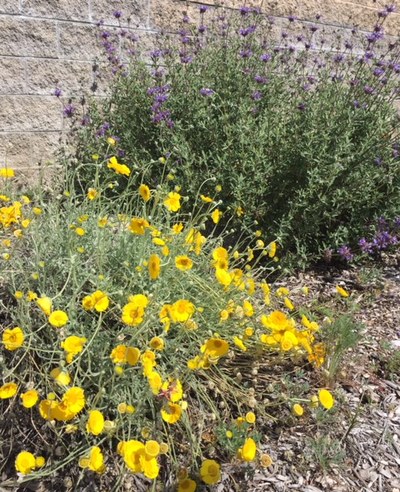 Minds and hearts and actions are shifting: Establishing the post office garden in 2016. (Photos by TP and Therese Brummel)
Minds and hearts and actions are shifting: Establishing the post office garden in 2016. (Photos by TP and Therese Brummel) On my block every Monday morning, nine people email back and forth to arrange yoga carpools. The yoga class is less than three miles away in a park. The carpool serves as a time to connect with neighbors, swap borrowed party plates and silverware, recipes and theatre reviews.
Rogue Yoga is a result of a yoga teacher wanting to give back to her community. She opened the class in 2011 for a five dollar donation and frequently reminded us that if we could not afford it we should still come. After five years she moved away. The new yoga teacher continues the tradition of the low donation. As we leave the class feeling limber, relaxed, alert and strong we comment to each other how lucky we are to enjoy the mountain view, changing clouds and busy hummingbirds while we practice yoga. There is a sense of connection to and gratitude for the beauty that surrounds the class.
On Fridays, two of us carpool to an early morning group meditation. Inner Transition, or a shift in consciousness, is an important part of being aware that every choice we make each day has impact on climate change: choosing the option that nurtures nature reduces fuel consumption or moves toward zero waste. The debate ensues on whether in order to lead a more Transition-based life, a raised awareness must come first or whether engagement in easy, resilience-building fun like yoga, gardening and sharing things comes first. It seems that both must develop together.
On Saturday mornings, six of us sometimes meet up at the neighborhood post office, weeding and pruning together in the garden that the larger neighborhood helped to establish. We share seeds and small plants that are crowding our gardens. The garden has been a delightful example of the theory of the broken window effect, where one broken window can quickly devolve to a second and then a dozen. But if the first broken window, or weedy plot of land in this case, is repaired promptly, the domino effect does not happen, the community is raised up. Disorder is abated by repair. Now that the post office has a beautiful array of native flowers, ground cover and trees, the trash on the property is reduced. The auto parts store across the street has tidied up its yard which was littered with trash and weeds. The bakery across the other street has built a counter with high stools so that coffee and nosh customers can gaze out to the lively bright yellows and purples and pungent blues and grays in the garden. In gratitude, the bakery donates loaves of leftover bread to Repair Café for the volunteers’ breakfast before repairs begin.
All these things embody the concepts of Transition. Abundance is shared. Waste is reduced. Relationships and community are nurtured. And by living more locally we are reducing our carbon footprint and helping climate change.
The Transition movement is based on Permaculture principles, which are the principles that have long been observed in Mother Nature herself. Nature takes care of people, shares in a reciprocal way, it nurtures relationships and leaves no waste. It is inherently sustainable and resilient. My neighbors may not see themselves as engaged with Transition Principles, but their minds and hearts and actions are shifting. The Transition movement gets the credit from my perspective, but as one of my dear mentors, Martha Fitzgerald liked to say, “A lot can be accomplished if you don’t mind who gets the credit.”
—Therese Brummel






